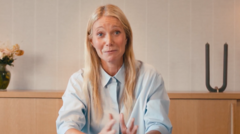In a candid discussion prompted by the Netflix series 'Adolescence,' a family reflects on the challenges posed by online misogyny, cyberbullying, and the intricate dynamics of teen relationships shaped by social media. The teenage protagonist’s story resonates with their experiences, revealing a pressing need for open conversations about these issues.
"Navigating Adolescence: A Family's Conversation About Online Influences and Misogyny"

"Navigating Adolescence: A Family's Conversation About Online Influences and Misogyny"
A teenage boy and his parents analyze the impact of social media and misogynistic content on youth in the context of Netflix's drama 'Adolescence.'
In Netflix's impactful drama 'Adolescence,' a 13-year-old named Jamie faces grave accusations after being ensnared by misogynistic online content and cyberbullying. The show has sparked vital discussions among families, including that of 15-year-old Ben* and his parents, Sophie and Martin. Their recent family viewing session reveals the complexities of parenting in the age of social media, especially regarding exposure to damaging ideologies.
Ben confides that discussing sexual topics with his parents is awkward, but he recognizes the importance of these conversations in the wake of the issues highlighted in the series. Jamie’s plight serves as a catalyst for Ben's parents to express their concerns about the profound impact of online content on their son.
As the family gathers in their living room for an open dialogue, Sophie and Martin strive to foster a communicative environment. They’re wary of how their son's online interactions might mirror Jamie's disturbing experiences, encouraging him to set boundaries on his smartphone usage. The themes of the show resonate with them, prompting discussions about concepts like the "manosphere" and incel culture, which remain somewhat obscure to Ben, highlighting the generational gap in understanding such phenomena.
Despite being a confident teenager, Ben admits that he finds some depictions in 'Adolescence,' such as the bleak male-female relationship dynamics, somewhat exaggerated. He notes that while the drama effectively captures some elements of contemporary adolescent life, it overlooks the positive aspects of social media and the realities teens navigate daily, pointing to a revisionist perspective shaped for adult viewers.
Concerns arise as the family confronts the pervasive influence of figures like Andrew Tate within youth culture. Ben remarks that although Tate's popularity has waned among his peers, the underlying issues of misogyny persist. He and his parents acknowledge that Tate is merely a symptom of broader societal problems, with Martin articulating that these issues might be better addressed through community engagement rather than fearmongering.
The conversation shifts to friendships between boys and girls, with Sophie expressing worries that her son lacks meaningful social interactions with female peers. Ben reveals that his understanding of such relationships often comes from social media, making their dialogues critical for improving his social skills.
'Adolescence' also brings to light the troubling issue of sharing intimate images without consent, a topic Ben is all too familiar with among his peers. He stresses that pornography is a significant issue affecting his generation, and he believes that open conversations about the harmful effects of such content are essential.
Ultimately, Sophie and Martin stress the importance of providing their son with opportunities to engage in physical activities and build self-esteem, as these serve as protective factors against negative online influences. They collectively agree that the responsibility to combat these challenges extends beyond just parents, implicating schools, tech companies, and society at large.
In this critical juncture of adolescence, Ben eloquently articulates the reality that social media interactions increasingly reflect real-life experiences, urging that these issues must be treated seriously. The family’s discussion exemplifies a broader necessity for open conversations about the challenges posed by internet culture on today’s youth.
*All names in this article have been changed.


















